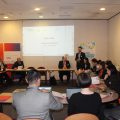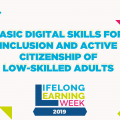15 Mar Digital skills are crucial for financial literacy
15 Mar, 2018
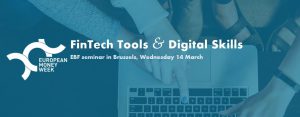 On 12-18 March 2018, the 4th European Money Week is organised by national banking associations across Europe, under coordination of the European Banking Federation, to highlight financial education. All the events during the Week are seeking to improve financial literacy through better financial education.
On 12-18 March 2018, the 4th European Money Week is organised by national banking associations across Europe, under coordination of the European Banking Federation, to highlight financial education. All the events during the Week are seeking to improve financial literacy through better financial education.
One of the flagship events for the Week was the seminar FinTech Tools & Digital Skills on 14 March, organised by European Banking Federation. In a half-day seminar, participants discussed the financial education in light of the digital revolution, Fintech tools possibilities and the importance of digital skills for financial literacy and inclusion.
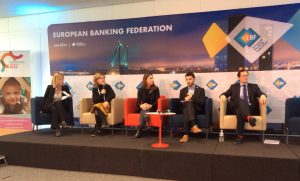 During the panel discussion Digital Skills: good practices in financial services, ALL DIGITAL’s CEO Laurentiu Bunescu emphasized the need to tackle the issue of digital literacy in partnership between financial institutions and educational providers. Financial literacy is also something to be addressed locally, in environments where people feel safe to start using digital tools to manage their money. The non-formal education sector represented by the digital competence centres has a high potential that can be exploited further to ensure digital financial inclusion.
During the panel discussion Digital Skills: good practices in financial services, ALL DIGITAL’s CEO Laurentiu Bunescu emphasized the need to tackle the issue of digital literacy in partnership between financial institutions and educational providers. Financial literacy is also something to be addressed locally, in environments where people feel safe to start using digital tools to manage their money. The non-formal education sector represented by the digital competence centres has a high potential that can be exploited further to ensure digital financial inclusion.
Laurentiu highlighted the need to increase the focus on adults and elderly in future financial and digital literacy policies as well as in initiatives such as the European Money Week.
In his presentation, Laurentiu included practical examples on digital and financial inclusion from ALL DIGITAL member organisations:
 In Extremadura, Spain, the training offer of our member AUPEX: Folk-High-School Association of Extremadura includes an 8-hour workshop called “Trends and practical uses of ICT”. Its content focuses on safety and awareness raising on topics like online banking, shopping, payment methods and key steps in identifying risks and threats. In 2017, 245 workshops were conducted in Extremadura, reaching 1615 participants, most of them were low-skilled unemployed people over 55, and. 67,1 % of them were women.
In Extremadura, Spain, the training offer of our member AUPEX: Folk-High-School Association of Extremadura includes an 8-hour workshop called “Trends and practical uses of ICT”. Its content focuses on safety and awareness raising on topics like online banking, shopping, payment methods and key steps in identifying risks and threats. In 2017, 245 workshops were conducted in Extremadura, reaching 1615 participants, most of them were low-skilled unemployed people over 55, and. 67,1 % of them were women.
In Lithuania, Association Langas I Ateiti cooperated with banks on financial literacy. They have organised a webinar “Safe Money Online”, which was broadcasted from National Library of Lithuania. 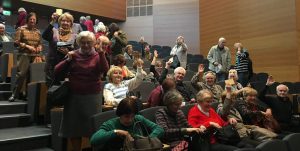 60 municipal public libraries (410 branches) invited local community representatives to join the event – in the local library on the screen they could watch and listen to the lectures of the well-known banks representatives. More than 3,660 people participated in the webinar, which has been very well evaluated by the attendants because of its important topic: safe mobile e-banking, fraud online, protection of personal data, samples of the real-life situations and advice to be protected online. Participants had the possibility to ask questions, and the most important/interesting questions were chosen, and the winners received prizes. This kind of activity has an added value because it can always be watched again.
60 municipal public libraries (410 branches) invited local community representatives to join the event – in the local library on the screen they could watch and listen to the lectures of the well-known banks representatives. More than 3,660 people participated in the webinar, which has been very well evaluated by the attendants because of its important topic: safe mobile e-banking, fraud online, protection of personal data, samples of the real-life situations and advice to be protected online. Participants had the possibility to ask questions, and the most important/interesting questions were chosen, and the winners received prizes. This kind of activity has an added value because it can always be watched again.
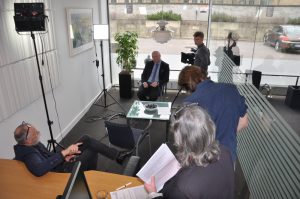 In Denmark, Telecentre-danmark has over the past two years focused tuition on digital financial solutions. They offer theme days and tuition materials to ICT centres on new digital methods of payment, for vulnerable, excluded groups, they conduct workshops and thematic “village meetings”, often in conjunction with local banks. And after attending the seminars, village meetings, or training, 98% of the citizens choose to use the digital solution, so Telecentre-danmark enabled participants to be truly digital citizens. For the Get Online Week 2017, they produced a 30-minute long TV programme New Methods of Digital Payments, which by now has been viewed by approx. 1 mln people.
In Denmark, Telecentre-danmark has over the past two years focused tuition on digital financial solutions. They offer theme days and tuition materials to ICT centres on new digital methods of payment, for vulnerable, excluded groups, they conduct workshops and thematic “village meetings”, often in conjunction with local banks. And after attending the seminars, village meetings, or training, 98% of the citizens choose to use the digital solution, so Telecentre-danmark enabled participants to be truly digital citizens. For the Get Online Week 2017, they produced a 30-minute long TV programme New Methods of Digital Payments, which by now has been viewed by approx. 1 mln people.
Our UK member Good Things Foundation also believes that digital skills and digital tools are crucial to ensure everyone can become financially included. They support financial inclusion through digital in a number of ways:
- Learn My Way
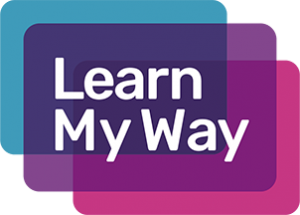 is an open learning platform, designed specifically for people with low digital confidence and designed to be used as part of a blended learning programme. It contains 31 online courses, covering a range of topics such as online and mobile banking, online shopping, financial budgeting online, claiming government benefits online. It is used by 200,000 people nationally each year. From Good Things Foundation’s experience, combining Learn My Way’s online courses with community support (through digital competence centres) is the best way to teaching digital financial inclusion.
is an open learning platform, designed specifically for people with low digital confidence and designed to be used as part of a blended learning programme. It contains 31 online courses, covering a range of topics such as online and mobile banking, online shopping, financial budgeting online, claiming government benefits online. It is used by 200,000 people nationally each year. From Good Things Foundation’s experience, combining Learn My Way’s online courses with community support (through digital competence centres) is the best way to teaching digital financial inclusion. - Money My Way is an “easy-to-digest” learning programme aiming to help the hardest to reach people to develop financial literacy skills to help them self-manage their finances. Since the start of the project in 2015, more than 50,000 people have benefited improve financial literacy, thanks to the support of the Online Centres Network
Also, Good Things Foundation is currently undertaking a research project that aims to support 720 individuals to improve their financial capability during 2017. The project seeks to test the following question: The ability to transact online can reduce the poverty premium. Are individuals receiving financial capability support better able to transact online if they are also supported to undertake a live transaction online? Early findings say – yes!
We support the statement that Skills have become the global currency of 21st century economies that spur growth and reduce inequalities. Digital skills education as well as the financial literacy are crucial for the 44% of Europeans lacking basic digital skills.


